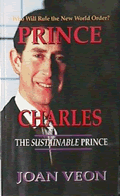Other
Veon
Articles:
US Leaders Highlight World Economic Forum Agenda
Global Taxation And Tax Harmonization
Does The
Global Economy Need a Global Currency?
THE FOUR DAYS THAT SHOOK THE WORLD
By
Joan Veon
January 4, 2007
NewsWithViews.com
The most recent market turmoil has been called by some, �The Four Days that Shook the World.� Literally that is no exaggeration. But it is not the whole story. Some have called the world �flat� because all of the political, economic, trade, legal, military, and intelligence barriers have been torn down. Some call it �interdependence� while others term the fall of the old barriers separating nation-states as �globalization.�
In the 25 years that I have spent in the investment world, I have studied trends, market moves, and have been, above all, a witness to the emergence of a global stock market which supports a world governmental structure. Up until 1980 when President Jimmy Carter passed the Monetary De-Regulation Act, Americans were not allowed to invest outside of the United States. About the time the U.S. passed this regulation, a number of other countries that were Group of Seven members, passed similar legislation, thus beginning the integration of markets, finances, economies, and business. As a result of the barriers falling between nation-states and pro-global investment measures, a world market has been birthed.
This world market is now supported by free trade, further changes in country laws to accommodate new regulations and oversight between countries. A new system has emerged: global accounting, global corporate taxation, the ability of foreign companies to list on American exchanges through the �American Depository Receipt�-ADR system, new ways of trading such as converting to dollars and cents instead of percentages, new electronic systems, and new types of investments.
This global market is in the process of being under-girded by a global stock exchange. In the past seven years, many of the world�s various stock exchanges have converted from being privately owned to being listed companies. Within the last few years, the New York Stock Exchange-NYX, the NASDAQ-NDAQ, the Chicago Mercantile Exchange-CME, the Chicago Board of Trade-CBOT have all gone public. The NYX is in the process of buying Europe�s stock exchange, the Euronext. The NDAQ has acquired over 25% interest in the London Stock Exchange but has not been successful in buying it and the Japanese are interested in American tie-ups. All of this signals a changing world.
A number of years ago the World Bank�s International Finance Corporation created stock exchanges in many third world countries such as Brazil, Ghana, South Africa, Korea, China, Malaysia, Vietnam, etc. Interestingly, in order for those countries to have companies to list on their exchanges, they were encouraged to privatize state assets and list them on their newly created exchanges. The World Bank helped out by buying 25% of whatever asset they sold and listed on the new exchange.
China has been the darling of investors for the last 18 years or so. Many people have been instrumental in helping to transition China from a closed economic system to a capitalistic one. Here in America we are fully aware of the American firms that have gone to China in order to �stay competitive� by employing slave labor over American workers. We are told this is to help them increase their profits for their shareholders. Imagine that. At the heart of the capitalistic system is the destruction of the old American capitalistic system which is now too expensive.
Furthermore, the architects of the global markets have created �market-based democracy� which means every conceivable asset that could be put into the market is there: automobile and credit card debt, mortgages, all kinds of derivatives, futures and options, stocks from every kind of privatized asset: water companies, electric companies, toll roads, etc. In a globalized world, it is possible for those with the most money to control key assets in every country that were formerly government assets. You know, �He who controls the most stock, bonds, currency, mortgages, controls the world.�
In the years that I have studied the various market moves, I have never been bored as I have tried to keep up with the �why�s� of what the market was doing and what it meant for investors. Every time I think I understand the market, I find that I don�t. This is because the market by its very nature is dynamic and it is constantly changing as a result of new investment products, new companies, new markets, and new buyers. In an open market, no one can control the ability of those with means to take advantage of everyone else, regardless of the hardship created. Still, there are other reasons that are mystical in nature which no one talks about.
What I have figured out is that when the barriers between the countries came down between the nation-states, that it created a LEVEL playing field for those with great economic power. The Rockefellers, Rothschilds, JP Morgans, Schiffs, and those of their magnitude, are able to �skim off the top� of a global market instead of just one country. Therefore, the goal of �free trade� and interdependence has another meaning: being able to kill more than one bird at a time. Make sense?
A number of years ago when the U.S. market tanked, we were told that when the U.S. sneezed, it affected other countries. What we are now being told is that when China sneezes, the U.S. catches a cold! Perhaps we should ask what this really means. Is the U.S. market losing out to the Communist Chinese market that was created by ruthless businessmen looking to turn China into another capitalistic U.S. system?
We are told there were three logical reasons for this sell-off: (1) A sell-off in the hot Chinese market; (2) Problems in the U.S. sub-prime mortgage market as a result of higher mortgage rates and a tightening of credit standards by Freddie Mac, (3) Remarks by former Federal Reserve Chairman Alan Greenspan, and (4) The carry trade market. Let�s take a quick look at these and what the market did.
First, China has grown by leaps and bounds as a result of U.S. and foreign multi-national and trans-national corporations moving manufacturing abroad to take advantage of China�s slave labor. The Chinese stock market increased by 130% in 2006 and closed above 3000 the week before the sell-off, an increase of 13%. Recently the Chinese government reduced the amount of money necessary to open a stock brokerage account, only to have as many as 90,000 new accounts open per day. As a result of the four days that rocked the world, the Shanghai market experienced a pullback of 9%, its biggest drop since the death of Deng Xiaoping in 1997.
According to the Wall Street Journal-WSJ, trading on Shanghai�s �A share market� is closed to foreign investors and it is local speculators who make up its primary investors. The WSJ reported they were jittery that the government would apply various brakes to growth. However in an interdependent world it is not just the Chinese investors who bid up share prices. It was also major foreign investors, both private and institutional. Investors poured a record $23B into U.S. emerging-market mutual funds with half of those monies going to China. So far this year, according to USA Today, $6.8B has gone into emerging markets. The American funds, Euro-Pacific Growth which has $99B in assets, fell 3.2% while Fidelity China Region dropped 3.7%.
There was a durable goods report in the U.S. published about the time the Chinese market was correcting that indicated big-ticket factor goods fell sharply in January. The concern was that the world�s two largest economies are slowing.
Secondly, the U.S. sub-prime market is unraveling. In 2000 when the Federal Reserve dropped interest rates to 45 year lows, it spurred incredible activity in the housing industry. Those with a home could sell at a gain and buy the bigger �dream home� while those without any means, could afford to buy something but at sub-prime rates which would increase as interest rates rose. Now foreclosures are at a high. Freddie Mac relaxed their standards to make mortgages, now they are tightening up their requirements.
Thirdly, Japan�s �Carry-Trade� has been impacted. According to the David Cho of The Washington Post, traders have been able to borrow from a Japanese bank at 0.5% and take that money and invest in U.S. Treasury which has been paying 5.25%, thus making a gain of 4.75% on the borrowed money that is if exchange rates between the countries do not change. It is estimated the amount of carry-trade to be about $1T. Carry-trade has kept U.S. Treasury rates low while allowing many hedge funds and investors to use it to make high-risk investments in the developing world. Now, it appears that carry-trade has started to unwind with money flowing back to Japan, thus pushing up the value of the yen against the dollar to an 11 week high. As a result of China�s drop, exchanges around the world fell: Shanghai down 9%, Toronto down 2.7%, London down 2.3%, and Paris down 3%. Thus, what we are seeing is the investment �loop holes� created as a result of low interest rates in the U.S. allow people who are high-risk buy a home at sub-prime rates and allow the carry-trade to prop up U.S. Treasury rates. But is that all? I don�t think so.
As I read various accounts of the market dropping 3.3%, the rise in the yen by 3.6%, key Asian exchanges falling by 3%, the number of CME contracts reach 11 million in on day, and the rise in the China market by 130% last year with a recent 13% surge the week before the drop that caused a 9% loss in value after it dropped on 2/27/07. This caused the U.S. market to fall 416 points or 3.3% which started around 3 p.m. EST in which all 30 stocks of the Dow fell more than 200 points in minutes only to drop a total of 546 points before closing down 416 points or up 130 points from the bottom. A total of $600B in value was erased from U.S. stock markets. It was the Dow�s 7th worst point decline and worst since 9/17/01, the first day the market opened after the 9/11 tragedy. Gold has dropped 6% in the last four days and crude oil was up 7 days in a row. On the day following the 416 point drop, U.S. markets closed down 34 points. Lastly, the yen was up 3.6% against the dollar.
|
Subscribe to the NewsWithViews Daily News Alerts! |
I
am not an expert in numerology but I do know that the numbers 3, 7,
9, 11, 13, 18, 28, 33, 36, and 39 have occult significance. Am I imagining
that there is another meaning to the drop in a global stock market
other than a �skimming off the top?�
� 2007 Joan Veon - All Rights Reserved
Sign Up For Free E-Mail Alerts
E-Mails
are used strictly for NWVs alerts, not for sale
 Order
Joan Veon's book;
Order
Joan Veon's book;
"The
United Nations'
Global Straitjacket"
Joan Veon is a businesswoman and international reporter, having covered 75 Global meetings around the world in the last ten years. Please visit her website: www.womensgroup.org. To get a copy of her WTO report, send $10.00 to The Women's International Media Group, Inc. P. O. Box 77, Middletown, MD 21769. For an information packet, please call 301-371-0541
E-Mail: jveon@adelphia.net
I am not an expert in numerology but I do know that the numbers 3, 7, 9, 11, 13, 18, 28, 33, 36, and 39 have occult significance. Am I imagining that there is another meaning to the drop in a global stock market other than a �skimming off the top?�













